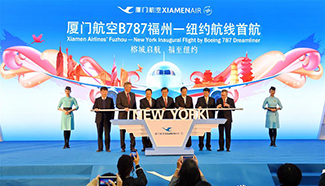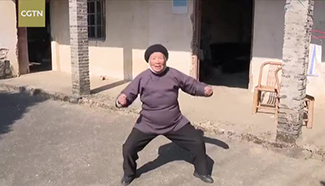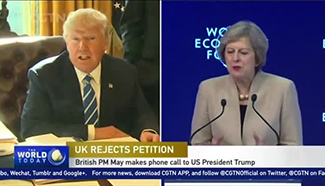DHAKA, Feb. 16 (Xinhua) -- Like many others who grow jute in Bangladesh, farmer Balai Kumar had no idea of the true value of the versatile natural vegetable fiber.
The Kumar family, who live in Bangladesh's central Faridpur district, located just over 100 kilometers from the capital city of Dhaka, in the past used to only use the jute sticks for cleaning purposes.
But they discovered that the ashes of jute sticks have many applications aside from being used for cleaning kitchen utensils.
The ashes, for example, can be used for making dry cell batteries, cosmetics, carbon paper, computer ink and various chemical products.
Such a realization has seen the Kumar family and thousands of others in the district who grow jute, earn a fair amount from selling the sticks to factories which are equipped with Chinese machinery and overseen by Chinese technicians.
"I'm from Gohal Bari village in the Faridpur district. I'm a farmer and I've been supplying jute sticks to the factory here. We never used to sell the sticks, but now there is a factory here we can make money from the sales," Kumar told Xinhua recently, adding that this business has helped his family economically.
Following the establishment of Bangladesh's first jute stick processing factory, called the Golden Carbon Factory in the district, jute farmers are quickly realizing the value of their natural product.
The ashes from the sticks are made by burning dried jute sticks at a certain temperature in special furnaces and the ashes are then crushed into jute stick carbon powder.
The manager of the Golden Carbon Factory said the technicians and machinery for this process comes from China and that the price per maund (equivalent to about 37 kg) of jute sticks ranges from 180 taka (2.24 U.S. dollars) to 220 taka (2.74 U.S. dollars).
"Our factory processes 14 to 15 tons of jute sticks a day and this requires two furnaces to be lit. This produces about 3 tons of ash from the two ovens," the manager said.
Abdul Khaliq Mollah, a retired defense officer, has been working as an administrative officer at the Golden Carbon Factory.
He said, "Initially, we buy materials from several wholesalers who purchase the jute sticks from rural villagers."
He went on to explain that there are 20-30 staff who are working in different factory sites set up for burning jute sticks and crushing coal. There are now 25 such factories operating on Bangladesh, he said.
These factories have created employment opportunities for rural villagers aside form just farming and menial labor, he added.
One such villager, Arif, who also works at the Golden Carbon Factory, said he has learned a great deal of technical skills from Chinese engineers and now works as a main technician in the factory.
"I earn about 30,000 taka a month from working here," he said, and added "my duty is to look after the burning process so that we produce quality ash."
Bangladesh exported jute stick carbon to China worth about 1.74 million U.S. dollars during the fiscal year ending June 2016 and Bangladesh enjoys tax free market access to China when it comes to the sale of jute stick carbon.
Countries like Japan, Turkey, the United States, Australia, Canada and Mexico are also in demand of the charcoal powder from Bangladesh's jute stick factories.












